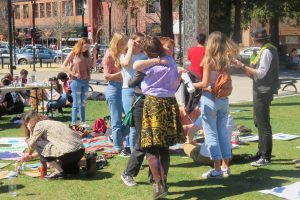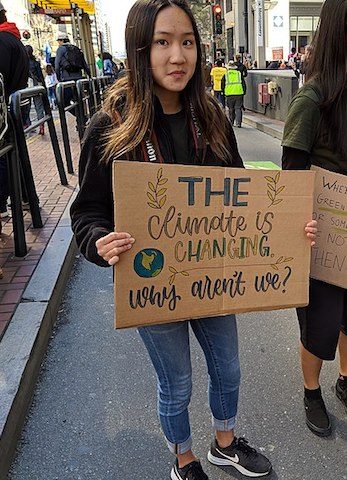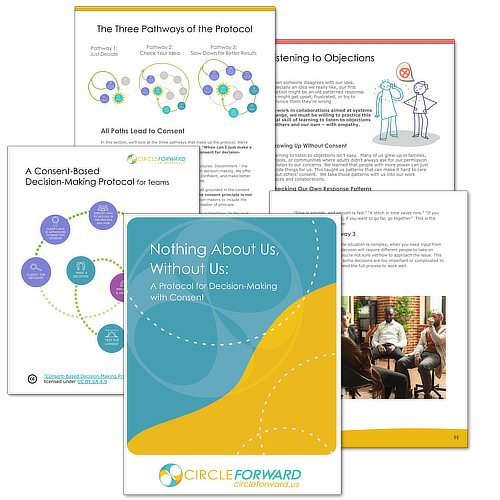In honor of the young leaders who are drawing attention to the ecological and existential crisis of climate change, this week of Sept 20-27, we want to share a vision for leadership and governance for the next decade.


We believe that those involved in collaborative governance networks — whether you call your work collective impact, multi-stakeholder partnerships, cross-sector coalitions, or system shifting networks — are part of a larger movement that spans tens of thousands of networks and 100s of millions of people, across every social-ecological system, around the globe.
We believe that collectively, we are, and for decades have been, weaving the mycelial-like networks of relationships and trust that have the power to transform the way the world works, over the next decade.

Your Current Work may Foreshadow a Great Democratic Leap Forward
You may think, “Wait, our efforts aren’t focused specifically on climate change, you must not be talking about our initiative.”
But you ARE nested within systems that are deeply interconnected. So, as everyone gets more skillful in their efforts to self-organize and navigate systems change work, we can imagine a tectonic shift in how societies make policy and direct resources.
How would it change your activities, if you knew your multi-sector, collaborative network could be foreshadowing the next great leap in democratic self-governance?
The following vision statement came out of a shared effort called the “Emerging Network Governance Initiative” aka “Governance Futures” early in 2019, and in particular, the contributions from:
- June Holley, Network Weavers
- Steve Waddell, SDG Transformations Forum
- Tom Atlee, Wise Democracy Pattern Language
- Curtis Ogden, Interaction Institute for Social Change (IISC)
- Caesar McDowell, Civic Designer and MIT Professor
- Tracy Kunkler, Circle Forward Partners
The Emerging Network Governance Vision
- We imagine a governance ecosystem where government agencies and legislative bodies are resourcing and participating as partners in a multitude of collaborative governance networks, with residents, nonprofits, businesses, educational institutions, and other stakeholders. Wicked problems in the public sector are addressed with the requisite diversity, inclusion and equity in these multi-stakeholder spaces.
- We imagine that such cross-sector networks are organized around whole systems and ecosystems; across jurisdictions and local, regional and national levels; and around every public area of concern (health, food, transportation, climate, large landscape conservation, education, economic development, housing, and more — and at the intersection of these issues).
- Every step of the public policy process, from ideation, to development, to implementation, to evaluation, is interdependently conducted within these networks and their increasing capacity for democratic participation.
- We imagine that new and diverse grassroots leadership, reflective of the demographics of our country and communities, is present as individuals from all walks of life participate in shaping and implementing policies and programs that have widespread community impact.
- We imagine open and transparent policy development and implementation processes that make full use of the technologies and platforms available, to offer opportunities for policy making, including a range of face-to-face and/or virtual processes to provide legitimate input, co-design, consent, and/or feedback. We imagine widespread community and civic participation in these processes each year.
- We imagine intentionally reparative governance structures and processes in networks that account for and directly address historic and ongoing inequities as well as the marginalization and oppression of people based on race, ethnicity, gender, income, ability, education, rural vs urban, and/or sexual orientation.
- We imagine all of this work strengthening diverse and intricate networks of social and human capital in communities, as well as the life-giving ecosystems on which they depend, which contributes to resilience, peacemaking, and shared and equitable prosperity.
How can this strengthen our democratic system?
- More and more diverse people in the U.S. are active participants in creating the policy and programs that impact their lives, their communities, and their country. They are much more civically engaged and influential, in processes that support their individual and collective well-being.
- Through the principle of subsidiarity, decision-making is pushed closer to the points of direct impact and engagement and generates more distributed and diverse civic leadership.
- Bipartisanship shifts as people build skills and engage successfully in decision-making with others who have different perspectives, working together to develop policies and programs that work for all.
A civic architecture of this scale, depth and capacity is already well underway. It is most visible when you look at how the local food movement has been self-organizing and developing for decades, but it cuts across policy and action of all kinds. We believe that resourcing and cultivating these social-ecological collaborative networks at every scale may be our best opportunity to guide democracy into an increasingly complex future, and shift systems at the scale and pace of change we need.

Contact us
We’d love to hear about your work.

